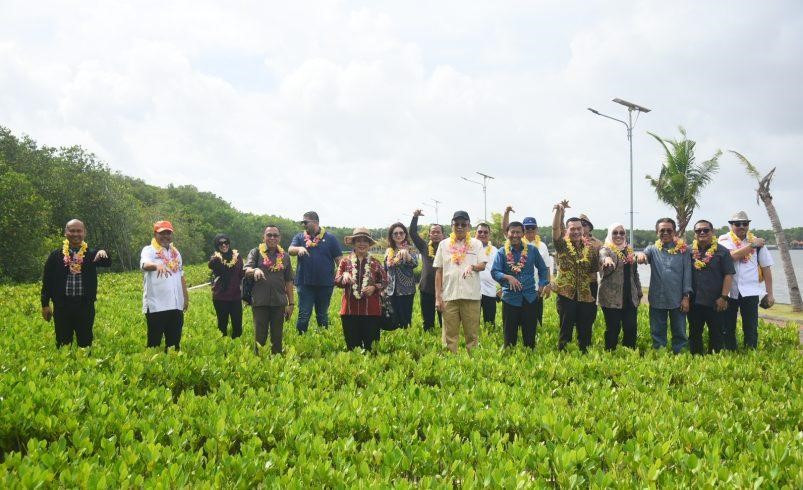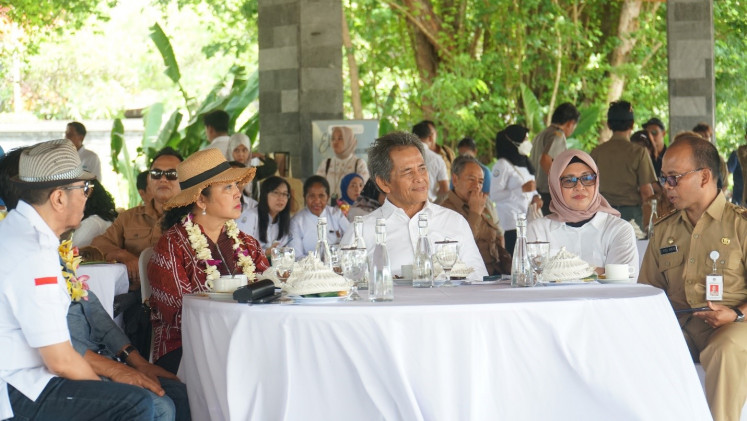Popular Reads
Top Results
Can't find what you're looking for?
View all search resultsPopular Reads
Top Results
Can't find what you're looking for?
View all search resultsHouse Commission IV proposes BRGM to become permanent institution
Change text size
Gift Premium Articles
to Anyone
T
he House of Representatives’ Commission IV has recommended the Peat and Mangrove Restoration Agency (BRGM) to become a permanent institution following a working visit to the Ngurah Rai Grand Forest Park’s (Tahura) mangrove area in Denpasar, Bali.
According to the commission, the existence of BRGM is one of the strategic steps in maintaining the sustainability of the mangrove and peat ecosystems in Indonesia. In addition to having high ecological value, mangroves also possess economic potential equivalent to mining resources, while their ability to absorb carbon makes them an important element in mitigating climate change.
House Commission IV member Daniel Johan highlighted the importance of BRGM's role in mangrove conservation and restoration efforts, adding that Indonesia’s mangrove rehabilitation is under the global limelight.
Daniel emphasized that mangrove conservation is not only oriented towards environmental protection, but must also bring direct benefits to the community.
Programs that encourage the active involvement of local communities in sustainable mangrove management can become a new source of income, simultaneously allowing the community to feel the economic benefits of the mangrove ecosystem while maintaining its sustainability.
Indonesia, one of the countries with the largest mangrove ecosystem in the world and the owner of the third largest peatland in the world, has a responsibility to maintain and preserve it. However, Daniel continues, the challenge lies in the temporary nature of BRGM as an ad hoc body. He stated that the existence of BRGM needs to be strengthened and efforts made to become a more independent and sustainable permanent institution.
With a more stable status, BRGM can make a greater contribution to the peat and mangrove restoration program while also strengthening Indonesia's position as a global leader in environmental conservation efforts. This initiative is not only important for the sustainability of local ecosystems, but also brings a positive impact on global efforts to deal with the climate crisis.
BRGM Head Hartono said BRGM’s mangrove rehabilitation is not a one-time job, as it requires support from various parties so that peat restoration and mangrove rehabilitation can run sustainably.
“This is a real action to support communities at the grassroots level, especially those living in peat and mangrove areas, to care about and actively participate in environmental restoration. Community welfare is improved through peat and mangrove restoration in protected areas," he said.
Since its establishment in 2016, BRGM has successfully carried out peat restoration covering an area of 1.6 million hectares across South Sumatra, Jambi, Riau, West Kalimantan, Central Kalimantan, South Kalimantan and Papua, more than the target set by the government in accordance with Presidential Regulation No. 120/2020.
From 2020 to present day, BRGM has also carried out mangrove rehabilitation covering an area of more than 40,000 hectares. Hartono added that this was a concrete manifestation of Indonesia's handling of climate change.
BRGM is optimistic on achieving the mangrove rehabilitation target through the Mangrove for Coastal Resilience (M4CR) program with support from the World Bank, covering an area of 75,000 hectares in four priority provinces of North Sumatra, Riau, East Kalimantan and North Kalimantan.











